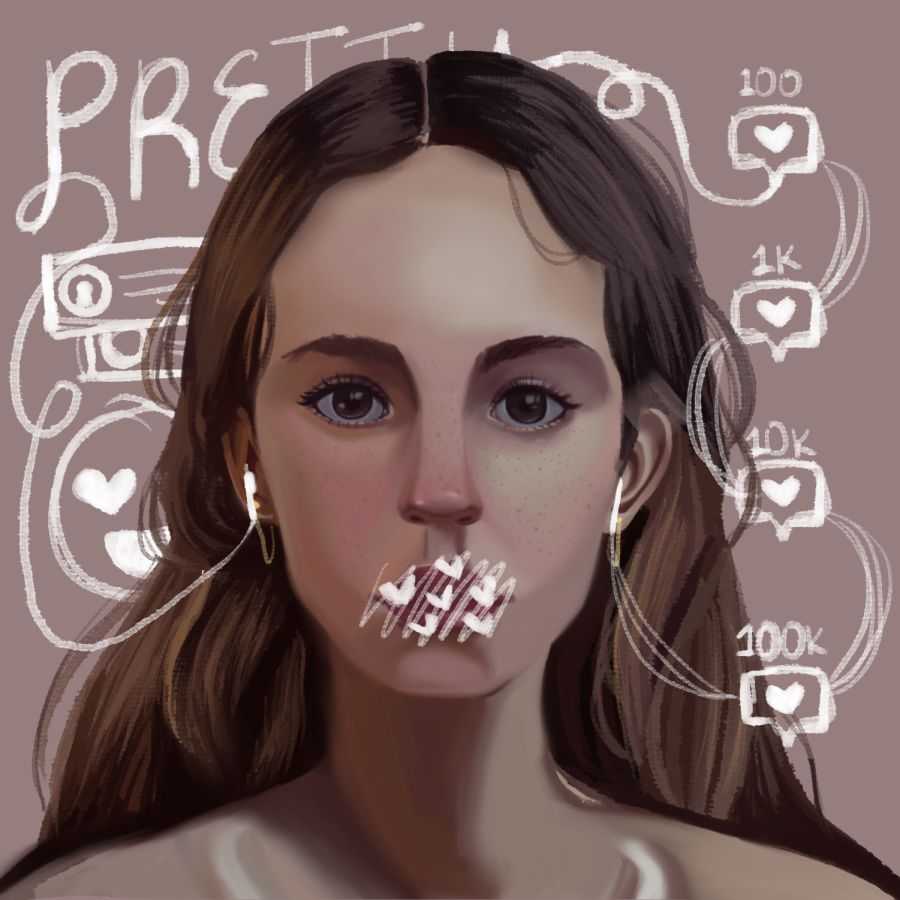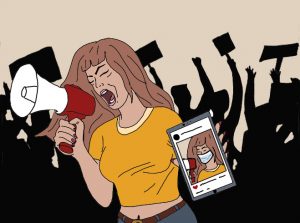Social media reflects a toxic image of our bodies
Social media beauty standards can suffocate users as they constantly compare themselves to “perfect” bodies.
February 15, 2021
Click…double tap…scroll.
As a student in middle school, my days were taken over by an endless feed of celebrity posts. I hoped that the advice of diet and fitness “gurus” would rub off on me as I counted calories and controlled.
Yet, every time I observed my body in the mirror, I was never satisfied. I always found something to pick on, whether it be the flaps of skin that rolled on my belly or my flimsy arms. At the time, it had never occurred to me that photos on social media could be edited or that the body types that surrounded my Instagram feed accounted for a very small percentage of the human population. It was so easy to compare myself with the unattainable standards of beauty that pictures on social media portrayed. But I was oblivious to how social media was controlling what I thought about myself; scrolling on Instagram was causing me to become obsessed with how my body appeared.
Social media is detrimental to our body image as it lowers our self-confidence and causes us to unwillingly compare ourselves with others. We get stuck in a never-ending cycle of wanting to check our phones to be updated on the latest trends and celebrities, but like any addiction, social media can be incredibly toxic to our mental health. Not only do teenagers experience this, but many others experience it as well. According to a survey conducted by the Huffington Post of men and women aged 28-73, 60% of social media users admitted that it has negatively impacted their self-esteem. Thus, instead of gaining positive connections with others, we struggle with our insecurities.
The source of this struggle comes from social comparison. Social media breeds social comparison, causing people to root self-worth from their number of likes and followers. We develop an unstable source of self-esteem based on other people’s opinions. This can negatively affect our mental health as we fear negative reactions from others.
“When we’re reliant on others for our sense of self, only feeling good if we get positive feedback or markers of status, we’re at risk for depression,” Mitch Prinstein explained, a psychologist at the University of North Carolina.
Some people may argue that social comparison isn’t inherently bad; after all, it is our mind’s way of evaluating our traits and abilities with others. It allows for healthy competition as we use other people’s achievements as motivation to help us succeed. However, competition can begin to negatively impact our lives since we become stuck in a loop of always wanting to be better than others. This can trigger stress as we never feel good enough compared to other people.
Social comparison is ubiquitous when we constantly view other people’s posts. Passively viewing other posts can alienate ourselves from others, as explained by Kaitlyn Burnell, a psychological sciences doctoral student at the University of Texas at Dallas, who published research on this topic.
“When a person is drawn to social media, they first browse other people’s content. That process can evoke comparisons between themselves and those people,” Burnell said. “This can yield a fear of missing out—the feeling that others are having more rewarding experiences. That, in turn, is related to depressive symptoms and indicators of poor well-being.”
Even if your intention may be to post content or communicate with your friends, our minds’ natural curiosity makes looking through other people’s posts nearly inevitable. And our eyes can be drawn to the constant influx of posts and content, leading to addiction.
I used to struggle with this, since even when I opened apps to communicate with friends, I unintentionally spent most of my time on aimlessly browsing through other people’s posts. As a result, I often compared my life to others’ idealized versions.
Specifically, passively browsing through social media has a similarly negative effect on teens’ body image. If someone’s feed is filled with pictures of “perfect” body types and models, they may start to feel inadequate or insecure about their own body image. According to Time magazine, psychologists have found cross-cultural evidence that links social media usage to body image concerns, dieting and body surveillance in teens.
In reality, photos can easily be edited or photoshopped to build a perfect body type for a picture or the perfect face. Even something as simple as a different pose can change the appearance of someone’s body in a photo. Of course, almost every social media user does this — no one wants to post pictures where our face and body look imperfect and flawed. We always want to show the world our best sides, even if it takes dozens of photos to do so.
This causes people to feel worse about themselves, as we form judgments of others through a digital lens. This digital lens is often inaccurate as it doesn’t show the full picture of a person, but only what they choose to share.
“People are comparing their appearance to people in Instagram images, or whatever platform they’re on, and they often judge themselves to be worse off,” says Jasmine Fardouly, a postdoctoral researcher at Macquarie University in Sydney, Australia.
As more users are interested in losing weight or becoming better-looking, they turn to the “wellness” and “fitness” industry. These movements have skyrocketed in popularity in recent years as some celebrities have established fan bases with millions of followers. These movements encourage “clean eating” and “wellness” to their followers, posting diet and exercise videos. While such efforts may seem like a positive resource to those concerned about their health, these diets may not be nutritional or reliable, as they can deprive people of necessary nutrients.
One example of this is influencer Ella Mills, who has over two million followers on Instagram and has established her own brand, Deliciously Ella. She has also written a series of “healthy eating” cookbooks and launched a successful blog. Unaware followers may adore her recipes and find them healthy, but her advice is not all glamorous. Her cookbooks are known to preach words such as “counting goodness, not calories,” yet dismisses many ingredients as “gross,” such as gluten and sugar. The Guardian even called her cookbook “arguably the most successful fad diet cookbook series in recent years,” as her book is filled with advice that promises fast weight loss with little scientific evidence to back the claims.
Instead of helping those who are struggling to find a healthy mindset with food, these “clean eating” claims may be hindering their progress. Ruby Tandoh wrote about her struggles with “clean eating” and “wellness” in a Vice article, as she yearned for an escape from her eating disorder. However, instead of finding comfort in Mills’ cookbooks, she was trapped.
“It seems clear-cut: Eating disorders are messy and unhappy, and wellness is a way out of that anxiety and disorder,” Tandoh explained. “But between the lines of the wellness cookbooks, I read a different story.”
According to the National Eating Disorders Association (NEDA), many clean eating diets fall under the banner of orthorexia, an eating disorder in which someone develops an unhealthy obsession with healthy food. While there’s nothing wrong with simply avoiding certain food, some people can develop an unhealthy mindset that causes them to fear certain food groups and limit their diet to only a couple of ingredients.
And through these “wellness” campaigns, social media users can fall into an obsession with healthy food items, as they surround their feeds with fad diets and unhealthy advice. This can cause them to deprive themselves of certain foods and have an unhealthy outlook on food.
“Wellness doesn’t cause eating disorders,” Tandoh said. “But when we advocate, and even insist upon, a diet so restrictive, moralizing, and inflexible, and market that diet to young women, and then dress it up as self-care: just how responsible is that?”
#Fitspo is a more extreme case of social media dictating how users feel about their bodies. Some of the hashtag’s content may seem harmless, yet other posts can label certain body types as “unhealthy” and have unrealistic standards for being considered “fit”. A study mentioned in Time magazine of 50 “fitspiration” sites revealed messaging indistinguishable from pro-ana (pro-anorexia) websites. Both of these types of websites include diet promotion and language that shames others for their body and weight.
One reason why the content from fitspiration hashtags is similar to destructive pro-ana ideas is because of Instagram’s bans on more severe hashtags, such as #proana or #thighgap. Some people may view this as a large step in the right direction for Instagram, as they were able to control the amount of harmful content posted. Yet the number of eating disorder posts has spread to other hashtags with alternative spellings.
“The more under the surface pro-ana gets, the trickier it becomes,” Denise Schneider, a psychologist”, said to Vice magazine.
With the negative content that gets spewed in social media, teens and young adults can become insecure about their bodies and lose their self-esteem. After viewing the same content over and over again, the messages start to get into your head and it may even lead to an obsession over other peoples’ bodies.
There’s no one-size-fits-all solution to the complex problem, but we teens should be more mindful of how we spend our time on social media. Instead of endlessly scrolling through post after post, we should interact with others in social media through messaging and sharing with others. This allows us to consume social media more sustainably and even find comfort in it.
Most social media platforms offer direct messaging features that allow people to stay connected with friends and family and share pictures with them. Social media is also a place to share your thoughts and memories with others through posting pictures. This is even more crucial during quarantine, as social media can be one of our only ways to chat with our loved ones.
We should also be more mindful of what our feed represents. As Marie Kondo says, we must “discard everything that does not spark joy” and try to avoid following accounts that harm our mental health. Instead, fill your feed with things that make you smile, such as funny cat videos or lighthearted memes.
But when social media can get too overwhelming, the best thing to do may be to give ourselves a break. Rather than just endlessly scrolling through Instagram or Tik Tok, try to find other hobbies or pastimes that give more fulfillment, such as going outside and taking a walk. Social media can trap us in our own digital bubble, and it is important to log off once in a while.
In the end, we must understand our own limits, and how social media affects us. We should never sacrifice our mental health just for the latest gossip or the most beautiful picture ever. Like anything, social media might be good in moderation, but too much of it can be devastating to our self-worth and self-esteem.






